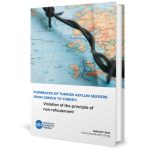Brazil’s Supreme Federal Court (STF) has ordered the release of Turkish-Brazilian businessman Mustafa Göktepe, who was arrested last week at the request of the Turkish government over alleged links to the Gülen movement, a faith-based group outlawed by Ankara, Turkish Minute reported on Friday.
Justice Flávio Dino, who authorized Göktepe’s release on Thursday, cited a lack of clear evidence in the Turkish extradition request and noted that Göktepe has been a naturalized Brazilian citizen since 2012. Under Brazil’s constitution, a naturalized citizen cannot be extradited for alleged crimes committed after naturalization — a condition the Turkish government failed to meet.
Göktepe, 47, has lived in Brazil for more than 20 years. He is married to a Brazilian woman and has two daughters. A prominent figure in the Turkish-Brazilian community, he owns a chain of Turkish restaurants and serves as president of the Institute for Intercultural Dialogue (Instituto Pelo Dialogo Intercultural), an NGO promoting cultural tolerance.
His arrest had sparked alarm among civil society groups and human rights advocates, who viewed the case as another instance of Turkey’s efforts to extend its domestic crackdown on dissidents beyond its borders.
The decision by Justice Dino stated that the Turkish government did not provide specific information about the location, date or nature of the alleged offense and failed to prove that any crime had occurred prior to Göktepe’s naturalization as a Brazilian citizen.
Göktepe’s lawyer, Beto Vasconcelos, welcomed the ruling, calling the arrest politically motivated and dangerous. “There is no legal basis under Brazilian or international law for this extradition,” he said earlier this week. “Mustafa is a defender of religious tolerance and democracy, and returning him to Turkey would put his life at risk.”
The case is part of a broader pattern of transnational repression pursued by the government of Turkish President Recep Tayyip Erdoğan, who has targeted the Gülen movement since December 2013, when corruption probes implicating Erdoğan’s inner circle were blamed on followers of the movement. Erdoğan labeled the group a terrorist organization and launched mass purges of civil servants, judges, journalists and businesspeople linked to it.
The crackdown intensified after a failed coup in July 2016, which Erdoğan accused Fethullah Gülen, the US-based cleric who inspired the movement and passed away in October, of orchestrating — a charge the movement strongly denies.
Since then, Turkey has filed scores of extradition requests worldwide and has used tactics such as illegal renditions, abuse of INTERPOL Red Notices, surveillance and diplomatic coercion to pursue critics abroad.
Göktepe’s case marks the third such attempt by Ankara to secure the extradition of a Gülen-affiliated individual from Brazil. The previous two — involving businessmen Ali Sipahi in 2019 and Yakup Sagar in 2022 — were rejected by the Supreme Federal Court on grounds of political motivation and insufficient legal basis.
CNN Brazil, in its coverage of Göktepe’s arrest, noted that no country apart from Turkey recognizes the Gülen movement as a terrorist organization and that such extradition requests have consistently been denied by democratic states due to concerns about judicial independence in Turkey. International watchdogs, including Human Rights Watch and Freedom House, have identified Turkey as a leading perpetrator of transnational repression.
The United Nations and the US State Department have also criticized Ankara’s use of international legal tools to target exiles, warning that it undermines international norms and places vulnerable individuals at risk of politically motivated abuse.















